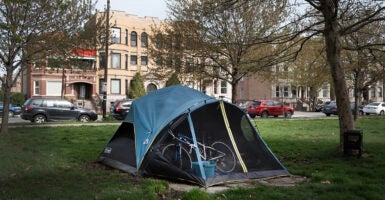The Supreme Court issued a 6-3 decision Friday holding that the government may punish the homeless by fines or imprisonment for trespassing or camping on public property.
In 2013, the city of Grants Pass, Oregon, had a population of roughly 38,000 and as many as 600 homeless individuals on any given day. Many of these homeless individuals clustered in encampments that all too frequently serve as a hotbed of disease, addiction, and rampant crime committed by and against the encampment dwellers.
In the case now known as City of Grants Pass v. Johnson, the city responded by enforcing its “camping ban” ordinance, which barred the use of blankets, pillows, and cardboard boxes while sleeping within the city. Violators were subject to a $295 civil fine for initial violations, which could escalate to $1,250 and 30 days in jail for repeat offenders convicted on charges of criminal trespass.
Similar ordinances, of course, have been adopted by many cities and localities throughout the country.
A lawsuit was promptly filed on behalf of a group of homeless individuals challenging the ordinance. The 9th U.S. Circuit Court of Appeals enjoined enforcement of the law, holding that it would violate the cruel and unusual punishments clause of the Eighth Amendment to the Constitution—“Excessive bail shall not be required, nor excessive fines imposed, nor cruel and unusual punishments inflicted”—to fine someone for sleeping on public property if no bed is available at a secular shelter.
In so ruling, the 9th Circuit relied on two earlier Supreme Court decisions—Robinson v. California (1962), which held that a state can’t criminalize the status of being a narcotics addict, and Powell v. Texas (1968), which held that a state may outlaw public drunkenness. These rulings, in the 9th Circuit’s view, barred the government from punishing someone for involuntary conduct, which sleeping ultimately is.
Writing for the majority in the Supreme Court decision issued Friday, Justice Neil Gorsuch resoundingly and rightfully rejected the lower court’s results-oriented interpretation of the high court’s precedents.
Gorsuch held that the enforcement of generally applicable laws regulating camping on public lands doesn’t qualify as “cruel and unusual punishment” and that public camping ordinances “are nothing like the law at issue in Robinson.”
Gorsuch noted that status is not the issue since it “makes no difference whether the charged defendant is currently a person experiencing homelessness, a backpacker on vacation, or a student who abandons his dorm room to camp out in protest on the lawn of a municipal building.”
Further, Gorsuch opined, the ordinance punished conduct, not status, and therefore was fully consistent with the high court’s opinion in the Powell case.
Moreover, he stated, the Constitution’s cruel and unusual punishments clause focuses on the question of “what ‘method or kind of punishment’ a government may impose after a criminal conviction, not on the question whether a government may criminalize particular behavior in the first place or how it may go about securing a conviction for that offense.”
While stating that there was no need to reconsider the Supreme Court’s decision in the Robinson case, Gorsuch noted that the court at the time “expressly recognized the ‘broad power’ States enjoy over the substance of their criminal laws.”
Additionally, Gorsuch noted, the penalties that Grants Pass adopted to prevent homeless encampments weren’t “cruel” because they weren’t remotely similar to the hideously painful punishments—such as drawing and quartering—that the Framers of the Constitution knew. Nor were those penalties “unusual,” he wrote, but rather laws of this ilk are “commonplace.”
Justice Clarence Thomas would have gone further, writing in a concurring opinion that, in his view, the Robinson case was wrongly decided and should be overturned.
In Thomas’ view, the high court’s holding in Robinson that the Constitution prohibits enforcement of laws that criminalize somebody’s status “conflicts with the plain text and history of the Cruel and Unusual Punishments Clause.”
Quoting from an earlier opinion by Justice Antonin Scalia, Thomas opined that for too long and on too many occasions, the Supreme Court has “proclaimed itself sole arbiter of our Nation’s moral standards.”
Justice Sonia Sotomayor, joined by Justices Elena Kagan and Ketanji Brown Jackson, dissented. Sotomayor decried what in her view was the court’s abdication of “its role in safeguarding constitutional liberties for the most vulnerable among us.”
Sotomayor stated: “It is possible to acknowledge and balance the issues facing local governments, the humanity and dignity of homeless people, and our constitutional principles. Instead, the majority focuses almost exclusively on the needs of local governments and leaves the most vulnerable in our society with an impossible choice: Either stay awake or be arrested.”
But in writing this, Sotomayor failed to offer any textual or historical analysis for this seemingly new constitutional right to camp on public lands, at least in the absence of adequate available public housing.
Dealing with homelessness is a difficult and longstanding problem with real consequences for public safety, government budgets, and humanitarian considerations. As Gorsuch recognized in Friday’s opinion, the issue of how to address homelessness “is complex” and the causes of homelessness “are many.”
Although we all may be sympathetic to the plight of the homeless, the Eighth Amendment doesn’t give federal judges primary responsibility “for assessing those causes and devising those responses,” Gorsuch wrote.
The Supreme Court’s decision in the Grants Pass case returns this problem to the political process, which is precisely where it belongs.































